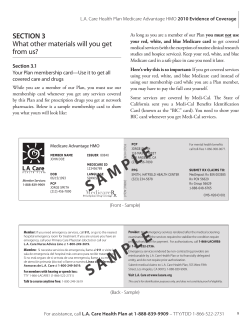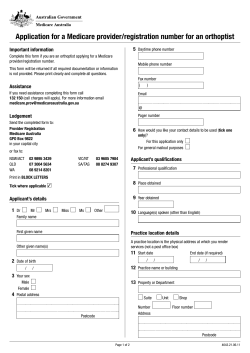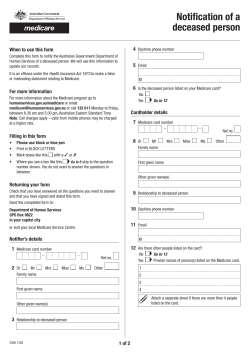
OR Medicare Part D Plans
SHINE Serving the Health Insurance Needs of Everyone Topics Part 1: Overview for SHINE and Medicare Part 2: Medicare Part D Part 3: Medicare Assistance Programs Part 4: Medicare.gov SHINE Overview Began in 1985 as a pilot program, in 1992 SHINE became available statewide with federal funding assistance Objective is to provide elders with access to accurate, unbiased health insurance information Network of 500+ volunteer counselors trained and certified by Elder Affairs to provide information, counseling and assistance regarding health insurance and benefits SHINE Counselors are available at many Senior Centers, Councils on Aging (COA), Area Agencies on Aging, and Aging Services Access Points (ASAP), Community hospitals and many other communitybased sites SHINE Counselors Explain Medicare Part A, B, C and D benefits and gaps Compare health insurance and prescription drug plans options, cost and benefits Screen for Prescription Advantage, Medicare Savings Programs, and Extra Help Provide assistance with the application process Help with claims and billing problems Start appeals and explain grievance procedures Know how to solve problems and ask the right questions SHINE Part D Enrollment Specialist Assist SHINE counselors by using tools on medicare.gov to get data into and get reporting from medicare.gov Assist counselors by comparing the cost and benefits of the programs available for clients This training is designed to help you handle basic matters; clients who are seeking assistance beyond basic inquiries should be referred to a SHINE Counselor Open Enrollment Period October 15th – December 7th Every plan changes from year to year Plans change premiums, co-pays, drug formulary, and can end their contract with Medicare If an individual elects not to do anything then they will remain in their current plan for the following year Medicare Overview Medicare is a health insurance program for: People 65 years of age and older • This is not necessarily full retirement age People under age 65 with disabilities • Deemed “disabled” by Social Security for at least 24 months Note: Medicare is NOT Medicaid: Medicaid is health insurance for very low income population and is called MassHealth in Massachusetts Medicare Card Each Medicare Claim Number is unique to a beneficiary The Number is made up of a Social Security Number and Letter (not necessarily the beneficiary’s SSN) Card lists effective dates Part A and B for Medicare Advantage Plans (MA-PD, Medicare Part C) Eligibility • Must have both Part A & Part B • Must live within plan service area 6 months a year • Must not have ESRD (end stage renal disease) • Must continue to pay Part B premium Characteristics Other Options for Drug Coverage Retiree Benefits (former employer benefits) Veterans Benefits MassHealth (Medicaid) & other related programs Medicare Part D Overview of Medicare Part D Began January 1, 2006 Voluntary Provides outpatient prescription drugs All Medicare beneficiaries are eligible Coverage for Part D is provided by: • Prescription Drug Plans (PDPs) also known as stand alone plans • Medicare Advantage Prescription Drug Plans (MA-PDs) Prescription Drug Plan Options Original Medicare Medicare Advantage Plan + Part D stand alone plan (PDP) + Medigap Policy Optional “add-on” Or other supplemental medical coverage OR For prescription coverage an individual must choose the Part D coverage offered by their Medicare Advantage Plan (MA-PD) Medicare Part D Plans All plans, MA-PD and PDPs must meet CMS standards • Cost structure • Formulary (drugs covered) • Pharmacy Access May also offer supplemental benefits Must coordinate benefits with SPAP’s (Prescription Advantage) and State Medicaid (MassHealth) programs that wrap-around coverage Formulary Standards Each plan has to cover “all or substantially all” the drugs in the following classes: • Antidepressants • Antipsychotic • Anticonvulsant • Anticancer • Immunosuppressant and • HIV/AIDS Plans must cover at least two drugs in each therapeutic class Plans may change their formularies during the year however must provide 60 days notice to each member taking the medication in question Examples of Part D Excluded Drugs Drugs for anorexia, weight loss or weight gain Drugs for the symptomatic relief of cough and colds Prescription vitamins and mineral products, except prenatal vitamins and fluoride preparations Non-prescription drugs (over the counter) Drugs used for Erectile Dysfunction (Viagra, Cialis, Levitra) Drugs that may be covered under Medicare Part A and/or Medicare Part B Standard Medicare Part D (2015) Level Deductible Description Annual $320 deductible paid by the Beneficiary. Initial Coverage From $320 to $2960 (retail cost of drugs) Beneficiary pays 25% of the drug costs and Medicare pays 75% Coverage Gap “Donut Hole” After $2, 960 in costs beneficiary pays 45% of brand name drug costs and 65% of generic drug costs until they have spent $4,700 out of pocket. Catastrophic When true out of pocket (TrOOP) costs reach $4,700 (excluding monthly premium) beneficiary pays 5% of the drug costs and Medicare pays 95%. Not All Part D Plans Are Made Equal! PDPs and MA-PDs may vary based on: • Benefit Design • Monthly Premium • Deductible • Coinsurance • Formulary • Drug Prices • Service Area How to Enroll Into Medicare Part D Review plan options • Plan Finder Tool on Medicare.gov • Determine Stand Alone Part D plan vs. Medicare Advantage Plan • Consider cost, coverage, quality, and convenience • Avoid drug restrictions Step Therapy Prior Authorizations Contact plan directly or call 1-800-Medicare • Enrollment can take place on the phone, online, or through a mailed in paper application Late Enrollment Penalty If an individual does not enroll when first eligible for Part D they may pay a penalty if they: • Have no coverage or have coverage but it is not considered creditable Penalty may be charged once an individual does join a Part D plan • A 1% increase in premium for each month an individual went without creditable coverage since Medicare eligible Penalty is 1% increase in premium based on a national standard base premium. Penalty is permanent Creditable Coverage Prescription drug coverage at least as good as standard Part D All Medicare beneficiaries (including those who are still working) must have creditable coverage to avoid late enrollment penalty Benefits administrator has information about whether the coverage is creditable Beneficiaries should be encouraged to ask the benefits administrator if they have not been notified about creditable coverage status Medicare Assistance Programs Assistance Programs May Help LIS aka “Extra Help” • Assists with Part D premiums and co-pays – apply thorough Social Security Prescription Advantage • Help with drug costs when in the coverage gap There are additional options that your SHINE Counselor will be aware of Extra Help/Low Income Subsidy (LIS) Extra Help is a federal assistance program to help low-income and low-asset Medicare beneficiaries with costs related to Medicare Part D. Extra Help subsidizes: • Premiums • Deductibles • Copayments • Coverage Gap “Donut Hole” • Late Enrollment Penalty • Does not subsidize non-formulary or excluded medications Administered by CMS and the Social Security Administration Prescription Advantage Massachusetts’ State PharmaceuticalAssistance Program (SPAP) Provides secondary coverage for those with Medicare or other “creditable” drug coverage (i.e. retiree plan) Provides primary coverage for individuals who are NOT eligible for Medicare Benefits are based on a sliding income scale only – No asset limit! Different income limits for under 65 vs. 65 and over Dual eligibles can NOT join (but those with LIS or MSP can join) Prescription Advantage For those with Medicare or “Creditable Plan” Helps pay for drugs in the gap (for most members) Those in top income category (S5) must pay $200 annual fee for limited benefits All medications must be covered by primary plan Benzodiazepines (xanax, lorazepam, valium, etc) are covered right away Members are provided a SEP (one extra time each year outside of open enrollment to enroll or switch plans) Prescription Advantage does not pay late enrollment penalty fee Medicare.gov Plan Finder What is the Meidcare.gov Part-D Plan Finder? A tool on Medicare.gov which helps you to find the drug plan that best fits the clients personal data and formulary It should only be used with the clients personal data and formulary It has all plans available within a zip code Pharmacy and clients formulary impact results Supported formularies vary by plan Coverage for Part D is provided by: • Prescription Drug Plans (PDPs) also known as stand alone plans • Medicare Advantage Prescription Drug Plans (MA-PDs) Using the Medicare Drug Plan Enrollment Form Using the Medicare Drug Plan Enrollment Form Continued How to use the Medicare.gov Plan Finder To effectively use the medicare.gov Plan Finder you need to do a personalized search and need the information noted below 1. 2. 3. 4. 5. Last Name DOB (date of birth) Zip Code Medicare Claim Number Effective Date for A or B A personal search will provide accurate and data about the client including their current status and “Extra Help” supports Doing a search on Medicare.gov Results and importance of a Personal Search Using the Medicare Plan Finder Part D Case Study Terry Torial - Case Facts/Assumptions: Meeting in person. Wants help with Rx drug Costs. Signed up for PartD during initial open enrolment she did not take drugs at that time. Now she does take Lipitor, Fosamax, Synthroid, and Ativan paying out of pocket. SS income $1,050. Assets 45,000. She does not appear frail. Part D Case Study Part D Case Study
© Copyright 2025









